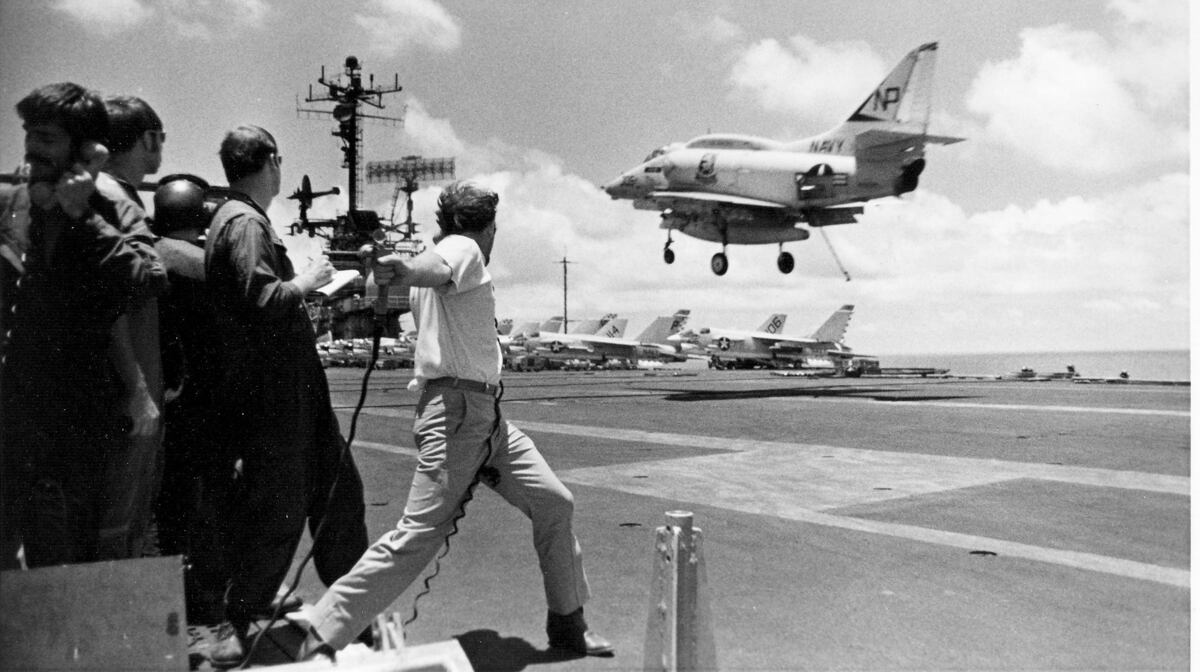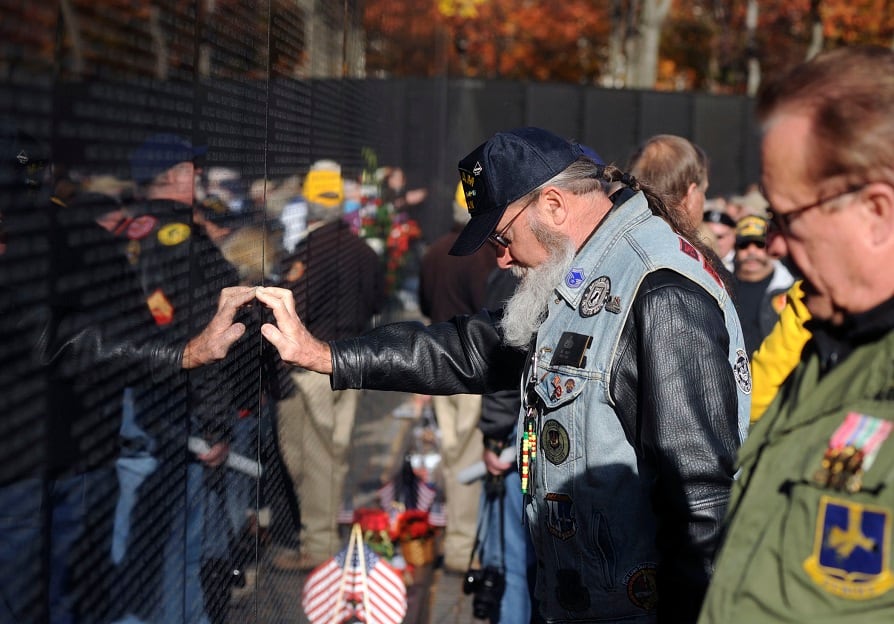The thing is, retired Marine Lt. Col. John “Jack” Jennings didn’t even really want the Distinguished Flying Cross, one of America’s highest battlefield honors, and he certainly didn’t push to get it pinned on.
But there he stood at a special ceremony July 27 at Naval Support Activity Mid-South’s Marine detachment in Millington, Tennessee. His longtime pal, retired Marine Col. Haywood Smith, presented it to the 88-year-old for his extraordinary heroism in the skies of Laos 52 years ago.
“I don’t like to use the word ‘hero,'" Jennings said during a telephone interview with Navy Times from the Texas border, where he was working. “Everyone who does this line of work for a living is a hero. There were guys who did a lot more than I did."
Yes, Jack Jennings is still working at 88. He’s a contractor for the Department of Homeland Security’s Federal Emergency Management Agency. He’s handling an assignment now along the Texas border with Mexico.
His Distinguished Flying Cross? It’s still in his suitcase.
There’s no question that he earned it. His award citation recalls the ruthless combat over Laos on April 29, 1966, when then-Maj. Jennings was one of four Marines piloting A-4E Skyhawks out of their base in Chu Lai, Vietnam.
The other three belonged to the “Bulldogs” of Marine Attack Squadron 223. He was an officer from group headquarters who joined them, part of a Marine policy that kept aviators on staff in the fight.

They drew a mission to destroy a target deep behind enemy lines, but bad weather forced them to veer off and assault a heavily defended position along the Ho Chi Minh trail.
Led by then-Maj. Malcolm Hornsby, the team chattered on the radio about how far away it was. They calculated the amount of fuel they’d have left to get there and back to Chu Lai and decided to risk it. But it would be close.
They also knew an earlier strike that day had been aborted when the jets ran into heavy anti-aircraft fire that was guided by North Vietnamese radar.
“But we weren’t thinking as much about that as we were about running out of fuel,” Jennings said.
As they neared the target, the lead jet encountered blistering flak but Jennings “began his attack without hesitation or concern for his own safety," according to the medal citation.
He lost both visual and radio contact with his team, but Jennings pressed on, weaving through enemy fire to drop his bombs and destroy several anti-aircraft guns.
He told Navy Times that every Marine jet got hit in the melee but he “didn’t count the holes” later.
When asked if he was scared, Jennings said that fear always dogs service members in combat but professionals find ways to make their training pay off when it matters the most.
“I didn’t think about it. I was a competent and confident pilot. If you’re worrying about that, you’re in the wrong business," he said.
But his heroism didn’t end there. Jennings had witnessed a large explosion and realized one of his fellow Marines got hit. It was Capt. William Francis Mullen, 31, from Brockton, Massachusetts.
“He immediately began searching for any sign of his comrade and remained in the last known vicinity beyond his minimal return to base fuel state until he was certain search and rescue aircraft were inbound,” the medal citation states. “By his steadfast determination, superb airmanship, and unexcelled dedication to duty in the face of hazardous flying conditions, Major Jennings reflected great credit upon himself and upheld the highest traditions of the Marine Corps and the United States Naval Service.”
Jennings and the other Marines didn’t want to leave, but their jet fuel was dwindling.
“You looked below and there were huge trees — all canopy,” he said.. “It was like a sea of green down there.”
Their fuel was so low that they were cleared for priority landings at Chu Lai.
The rescue teams never found Mullen. Listed as missing in action in 1966, he was declared killed in action 10 years later. Over those years the Pentagon posthumously promoted him to major and then lieutenant colonel.
His name is chiseled on Panel 73, Line 11 of the Vietnam Veterans Memorial in Washington.
RELATED

Flight leader Hornsby apparently began to draft valor citations for both Mullen and Jennings, but they never percolated far up the chain of command.
Jennings had returned to headquarters at Chu Lai and did another tour in Vietnam later with the “Tomcats” of Marine Attack Squadron 311 before retiring from the Marine Corps in 1973 after two decades of service.
He said he never knew what became of his medal but he also didn’t care.
“I’d forgotten all about it, to tell you the truth,” Jennings said.
In 2015, however, he was chatting with a longtime friend, retired Marine Lt. Col. Robert B. Sinclair, a former World War II pilot who commanded Marine Attack Squadron 223 in Vietnam in 1966.
“He turned to me and he said, ‘Jack, did you ever get your DFC?’ And I told him I hadn’t,” said Jennings.
It was Sinclair who wrote to the Marine Corps to see if the flight team could receive the medals five decades later. Over the years Hornsby had died, but Jennings could write out a statement to support an award for Mullen, officials told Sinclair.
That began a three-year quest, with the Marines asking both men for any documents they might have saved from Vietnam.
And that’s when Jennings found a four-page handwritten letter from Hornsby. It had been posted to him in 1972, when Lt. Col. Hornsby was getting out and shortly before Jennings retired.
“I can’t tell you why I kept it and I can’t tell you why he sent it,” said Jennings. “But there it was.”
It was a complete recounting of the battle, probably Hornsby’s narrative for the intended award citations that never got approved.
A pair of Marine medal boards sifted through the evidence for the citations and determined the heroism of Jennings and Mullen had been overlooked. After he became Navy secretary, Richard V. Spencer — himself a former Marine aviator — endorsed their "“heroism and extraordinary achievement” over Laos 52 years ago, and their citations were prepared.
Jennings said that the Marines would schedule a special ceremony to finally honor Mullen with his medal, too.
He continues to downplay the acclaim, except to say how honored he was for Col. Smith to present his medal and that Lt. Col. Sinclair cared about his award so many years later.
And that’s bittersweet because Sinclair also died before Jennings received it.
“You have to remember that my generation was right behind the World War II guys,” Jennings said. "We remembered World War II very well. We collected grease and recycled rubber tires and we read about all the great Marine aces of World War II. They were our heroes.
“And then when we got to the Corps, we were flying on the wings of these heroes, men who had flown in the Black Sheep Squadron alongside Pappy Boyington. They’d fought in World War II and Korea. We wanted to live up to their example.”
Geoff is the managing editor of Military Times, but he still loves writing stories. He covered Iraq and Afghanistan extensively and was a reporter at the Chicago Tribune. He welcomes any and all kinds of tips at geoffz@militarytimes.com.
Prine came to Navy Times after stints at the San Diego Union-Tribune and Pittsburgh Tribune-Review. He served in the Marine Corps and the Pennsylvania Army National Guard. His awards include the Joseph Galloway Award for Distinguished Reporting on the military, a first prize from Investigative Reporters & Editors and the Combat Infantryman Badge.




